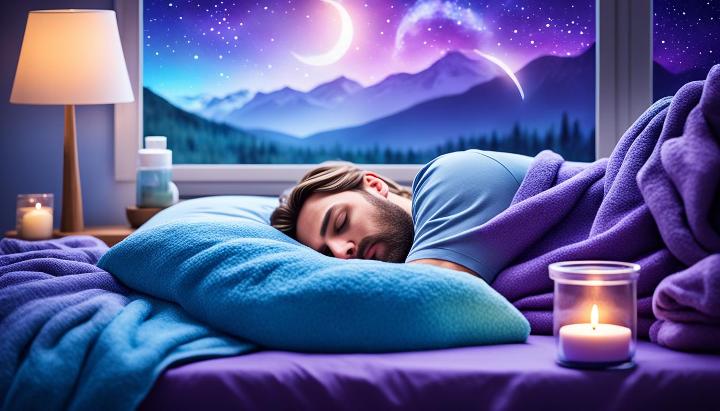Welches Magnesium ist am besten für den Schlaf? Unser umfassender Ratgeber

If you're not getting enough shut-eye, you're in good company. One out of every three adults doesn't sleep the recommended number of hours, says the CDC. Whether it's a packed schedule or sleep just escapes you, the effects are serious. Lack of sleep raises your chance of dealing with heart issues, being obese, getting type 2 diabetes, or feeling down.
Key Takeaways
- Magnesium is crucial for over 300 body functions, from heart and bone health to immune system and energy production support. [1]
- Taking magnesium supplements can help you relax, lower your stress, boost GABA (gamma-aminobutyric acid) levels, and regulate your sleep cycle. This can lead to better sleep quality and more hours asleep. [1]
- Wenn Sie Magnesium für einen besseren Schlaf benötigen, greifen Sie zu Magnesiumglycinat. Es ist dafür bekannt, dass es Ihnen hilft, besser zu schlafen. [1]
- The right amount of magnesium to aim for each day is 310-420 mg as an adult, depending on whether you're a man or a woman. [1,2]
- Wenn Sie zu viel Magnesium einnehmen, können Nebenwirkungen wie Magenverstimmung, Übelkeit oder Herzrhythmusstörungen auftreten. [1]
Sleep isn't just lying still; it's your body's healing time. From building memories to managing your mood and even keeping you from getting sick, sleep is crucial. It affects many things that keep you healthy and feeling well.
Magnesium is key for good health. It's a major part of your diet, needing more than smaller minerals like zinc and iron. Adults should aim for 400 - 420 milligrams a day if they're male, and 310 - 320 milligrams if they're female. [1]
Magnesium kann viel für Ihren Schlaf tun. Es entspannt Ihre Muskeln, was großartig ist, wenn Sie Krämpfe oder verspannte Muskeln haben, die Sie nachts wach halten. Es ist auch mit der Produktion von Melatonin, dem Schlafhormon, verbunden. Und es hilft, indem es Stress reduziert, was das Einschlafen erleichtert. [1]
For sleep, magnesium glycinate is the top pick, according to Dr. Ankrehah Trimble Johnson. It includes glycine, an amino acid that may help with sleeping, according to some studies on animals. [1]
The Importance of Quality Sleep
Sleep isn't just time spent doing nothing. It's when our bodies work hard to recharge and heal. This helps with things like remembering, staying in a good mood, and fighting off sickness. [3]
Sleep and Health
Getting enough good sleepis key to staying healthy. Lack of sleep can lead to serious health problems like heart issues, obesity, diabetes, and feeling down. [3] It's important to sleep well to be at your best, both physically and mentally.
Stages of Sleep
Sleep has different parts, like light and deep sleep, and REM sleep where we dream. Each kind of sleep helps us in a special way, like repairing our body and sorting our memories.
Knowing about these sleep stages can help us sleep better. This is by letting us know what we need to do to make sure we get the right kind of sleep.
Sleep-Wake Cycle
Unser Schlaf folgt einem regelmäßigen Rhythmus, dank eines Prozesses, der als circadianer Rhythmus bezeichnet wird. Dieser Rhythmus wird durch Licht und das Hormon Melatonin bestimmt. Ein regelmäßiger Schlafrhythmus hilft unserem Körper, im Einklang zu bleiben, was es einfacher macht, gut zu schlafen und sich energiegeladen zu fühlen.
Magnesium verstehen
Magnesium ist ein Schlüsselmineral für eine gute Gesundheit. Wir brauchen mehr davon als bestimmte andere Mineralien wie Zink. Erwachsene Männer benötigen 400 bis 420 Milligramm pro Tag. Frauen benötigen 310 bis 320 Milligramm täglich. [3]
Functions of Magnesium
Magnesium plays a role in 300 body processes. These include making energy, controlling blood pressure, and moving nerve signals. It also helps your muscles work. [4] Having enough magnesium is vital for your health.
Dietary Sources of Magnesium
Top sources of magnesiumare roasted pumpkin seeds and chia seeds. Almonds, cashews, and peanuts are also high in magnesium. [3] Even so, many people in the West don't get enough magnesium from food. [4] If you find it hard to eat foods rich in magnesium, considering supplementsmight help.
Magnesium and Sleep Regulation
Magnesium is key for a good night's sleep. It helps relax muscles, easing issues like muscle cramps and restless legs. [3] Dies ist sehr wichtig für den Schlaf, da verspannte Muskeln Sie nachts wach halten können. Außerdem steigert Magnesium die Melatoninproduktion. Melatonin ist das Hormon, das Ihrem Körper sagt, dass es Zeit zum Schlafen ist. [5] Indem Sie Magnesium einnehmen, signalisieren Sie Ihrem Körper, dass es Schlafenszeit ist.
Besides, magnesium is good at managing stress. It lowers cortisol, which is the body's stress hormone. [5] By keeping stress in check, magnesium makes it easier to fall asleep.
Die Rolle von Magnesium bei der GABA-Produktion
Magnesium has another trick up its sleeve. It helps produce GABA, a brain chemical that calms you down. This action further aids in better sleep by making your mind and body relax. [5] When your body and mind are calm, falling asleep becomes a smoother process.
Magnesium- und Melatoninspiegel
Magnesium hat viele weitere Funktionen: Es fördert die Melatoninproduktion. Melatonin steuert, wann Sie schlafen und wann Sie aufwachen. [5] So, by topping up magnesium, you're helping your body's sleep clock work better.
Es gibt auch Beweise dafür, dass eine magnesiumreiche Ernährung die Schlafqualität verbessern kann. [5] Dies funktioniert, weil Magnesium und Melatonin jeweils ihren Teil dazu beitragen. Magnesium reduziert Stress und hilft Ihnen beim Entspannen, und Melatonin hält Ihren Schlafrhythmus im Rhythmus. [5] Die zusätzliche Einnahme von Magnesium, Melatonin und B-Vitaminen könnte die dreifache Bedrohung gegen Schlaflosigkeit sein. [5] This mix helps in different ways to improve how well and how long you sleep.
Welches Magnesium ist am besten für den Schlaf
There are many types of magnesium, like citrate and glycinate. For those wanting better sleep, magnesium glycinate is often recommended. Dr. Ankrehah Trimble Johnson says this. It has glycine, which studies on animals show could help sleep. [6]
Magnesium Form | Potential Benefits for Sleep |
Magnesiumglycinat | Contains the amino acid glycine, which may have sleep-promoting effects. |
Magnesium Citrate | May help with muscle relaxation and stress reduction, supporting better sleep. |
Magnesium Oxide | Can help with insomnia, but may be less bioavailable than other forms. |
Magnesium Taurate | Die Kombination von Magnesium und Taurin kann eine synergistische beruhigende Wirkung für eine verbesserte Schlafqualität haben. |
About 30% of grown-ups have trouble sleeping. [6] The NIH says women need 310–320 mg and men need 400–420 mg a day. You might sleep better in a week from taking magnesium. But those very lacking might need more time to feel the effects. [6] Die Einnahme von zu viel Magnesium kann zu Magenproblemen, niedrigem Blutdruck und Schwächegefühl führen. [6]

Different Forms of Magnesium
Es gibt viele Arten von Magnesiumpräparaten. Jede Art hat etwas Besonderes. Wenn Sie das wissen, können Sie das richtige für einen besseren Schlaf finden.
Magnesium Citrate
Research with 14 men found that magnesium citrate is easy for our bodies to use. It’s better absorbed than other kinds. [4]
Magnesium Glycinate
Magnesium glycinate is great for sleep, says a doctor. It gives you something called glycine, which might help you sleep better. [4]
Magnesium Oxide
Studies show magnesium oxide doesn't get into our system so well. This might mean it's not the best for tackling low magnesium levels. [4]
Magnesiumchlorid
Magnesiumchlorid wirkt schnell, wenn man es oral einnimmt. Es wird von Menschen bei verschiedenen Beschwerden wie Sodbrennen oder einem niedrigen Magnesiumspiegel eingesetzt, was wissenschaftlich belegt ist. [4]
Magnesium Taurate
In animals, magnesium taurate seems to help with blood sugar and pressure. But we need more studies with people to be sure. [4]
Choosing the Right Magnesium Supplement
Um den Schlaf durch mehr Magnesium zu verbessern, sollten Sie einige wichtige Dinge beachten. Männer sollten 400 bis 420 Milligramm pro Tag anstreben. Für Frauen sind es 310 bis 320 Milligramm täglich. [1]
Dosage and Timing
For supplements, it’s best to follow the label’s advice. Taking it 30 minutes before bed is a good idea. Dr. Stephenson suggests 100 to 350 milligrams. Start with a small amount to see how it works for you [3]
Elemental Magnesium Content
Check the labelto know the real magnesium amount in each serving. It's better not to go over 350 milligrams a day on supplements. This helps avoid any bad side effects. [3]
Always talk to a doctor before adding new supplements to your routine. Everyone reacts differently, and a pro can offer the best advice for you. [1]

Magnesium Glycinate for Better Sleep
Magnesium glycinate is a top pick for better sleep, says doctor Ankrehah Trimble Johnson, D.O. She explains it’s great because it has a special mix of magnesium and the amino acid glycine. This mix might help you sleep better, research shows. [3]
Magnesium is vital for our sleep patterns. [3] Sadly, many in the U.S., both kids and adults, don't get enough magnesium. This could lead to sleeping problems. [3] The amount of magnesium we need varies but for most adults, it's between 310 and 420 milligrams a day. [3]
So, taking magnesium glycinate can help deal with this shortage and give your sleep a boost. [3] People with more magnesium in their bodies tend to sleep better, longer, and feel less tired the next day. [3] Also, magnesium might be good for fighting insomnia, or sleep issues. [3] Eine Studie ergab, dass sich der Zustand von Menschen in den Sechzigern mit Schlaflosigkeit nach der Einnahme von Magnesium verbesserte. [3]
Wenn Sie Magnesiumglycinat zum Schlafen verwenden, halten Sie sich an die Dosierungsempfehlung. [3] Experts say not to take more than 350 milligrams a day to stay safe. [7] It might take a few days or weeks to see the benefits, so keep at it. [3]
Magnesium Taurate for Restful Nights
Magnesiumtaurat kombiniert Magnesium mit der Aminosäure Taurin. Zusammen verstärken sie die Wirkung des jeweils anderen im Körper. Taurin hat wie Magnesium eine beruhigende Wirkung auf das Gehirn. Dies hilft, schlafbezogene Neurotransmitter zu regulieren. [8] Because of this, Magnesium Taurate is very good for improving sleep. It helps in both falling asleep and ensuring the sleep you get is deep and refreshing.
Benefits of Magnesium Taurate
This mix has several advantages for sleep:
- Das Gehirn beruhigen: Magnesium und Taurin beruhigen gemeinsam das Gehirn. Dies ist hilfreich beim Einschlafen. [8]
- Promoting Relaxation: Magnesium relaxes muscles, while taurine soothes the brain. This combo helps with stress, making sleep more restful. [6]
- Verbesserung des Schlafzyklus: Magnesium unterstützt den Schlaf-Wach-Rhythmus des Körpers. Dies geschieht durch die Produktion von Melatonin, das zu einer besseren und längeren Schlafqualität beiträgt. [6]
- Benefiting Specific Populations: Magnesium Taurate can be particularly useful for people with insomnia, anxiety, and depression. It tackles some root causes of sleep problems in these groups. [6]
The power of magnesium and taurine working together is clear. Magnesium Taurate is a great, natural choice for those needing improved sleep and relaxation.
Magnesium Dosage for Sleep Quality
Recommended Daily Intake
The Recommended Dietary Allowance (RDA) for magnesium is 310 to 420 milligrams for adults. This amount varies by age, gender, and if one is pregnant. Taking more than 350 milligrams for sleep may cause issues like diarrhea and nausea. [3] For daily magnesium needs, women should aim for 310–320 mg, while men need 400–420 mg. [6]
Dr. Stephenson suggests using a magnesium supplement. Take it half an hour before sleep as per the product instructions. [3] Starting with 100 milligrams is advised by Dr. Johnson to see how your body reacts. [3] It's safe to take magnesium daily, but avoid more than 350 milligrams a day. Talk to your doctor about possible drug interactions. [3]
Older adults and those with special health conditions might find magnesium helpful for sleep. This includes people with digestive issues, alcohol misuse, diabetes, and mental healthconcerns like anxiety and depression. [6] A recent study showed magnesium helped older adults with insomnia sleep better when they took 320–729 mg daily. [9]
Remember, it's not recommended to take over 350 mg of magnesium supplements each day to stay safe. Plus, watch out for interactions with certain medicines like antibiotics and diuretics. [9]
Side Effects and Precautions
Magnesium is safe in the right amounts, but too much can cause problems. It might lead to diarrhea, nausea, vomiting, or abdominal cramps. Other side effects include an irregular heartbeat, thirst, and low blood pressure. [6]
Safety During Pregnancy
During pregnancy, aim for 350–400 milligrams (mg) of magnesium each day. If you're breastfeeding, you should get 310–360 mg daily. [10] Sprechen Sie immer mit Ihrem Arzt, bevor Sie Magnesiumpräparate einnehmen, um sicherzugehen, dass es unbedenklich ist.
Population | Recommended Daily Magnesium Intake |
Adult Women | 310–320 mg |
Adult Men | 400–420 mg |
Pregnant Women | 350–400 mg |
Breastfeeding Women | 310–360 mg |
Getting too much magnesium can have effects like tummy troubles or a fast or weak heartbeat. Make sure to follow dosage advice and speak with your doctor first, especially if you're pregnant or have health issues. [10]
Conclusion
Magnesium ist ein wichtiges Mineral, das für seine schlaffördernde Wirkung bekannt ist. Magnesiumglycinat zeichnet sich durch seine beruhigende Wirkung aus. Die beste Form und Dosis von Magnesium kann jedoch für jeden anders sein. [11]
If you're still not sleeping well, talk to your doctor. They can check for health issues like sleep apnea or mental health problems. These conditions may need special attention. [12]
It's vital to practice good sleep habits too. Try to keep a regular sleep schedule and wind down before bed. These steps, along with magnesium, can help you get the sleep your body craves. [12]